
We are the manufacturer and supplier of reflective safety jackets in China, for our work clothing used primarily in the oil and construction industries. We have our own safety clothing factory that can produce different types of reflective safety jackets, such as custom safety jackets, boiler suits, flame retardant jackets, fire resistant coverall, police safety jacket, reflective shirts, waterproof jacket, and more. We have EN11612 and UL certifications for our coverall, which can guarantee high quality.












We Are a ONE-STOP Shop: This means that all processes are finished under one roof. You only have to concentrate on design and marketing, while we take care of the rest.
We Are a ONE-STOP Shop: This means that all processes are finished under one roof. You only have to concentrate on design and marketing, while we take care of the rest.
We Are a ONE-STOP Shop: This means that all processes are finished under one roof. You only have to concentrate on design and marketing, while we take care of the rest.
We Are a ONE-STOP Shop: This means that all processes are finished under one roof. You only have to concentrate on design and marketing, while we take care of the rest.

My name is Khalil , I love working with Hongyu Apparel, They made the design process and manufacturer process very easy. Especially for a first time designer.


Hongyu Clothes Maker is the perfect solution for all your garment and clothing manufacturing needs. From sample development and bulk production to label printing, delivery of goods — the experts at this factory will take care every step along with you!
We offer wide range of products such as women’s dresses or men’s shirts, sportswear and swimwear — there are many styles available which means that whatever kind clothing design you required, we can easily made it.
We have a team of professionals who will turn your design into reality. With our expertise, you can be assured that each product meets the highest standards for quality and craftsmanship while still maintaining an affordable price point.
With more than 100 clothes makers, we can make any volume of orders, big or small. Our turnaround time is very short, which means that it will grow your business quicker!
We ship all over the world through DHL, FedEx, UPS etc., so you don’t have to worry about anything at hand – just relax while our team takes care of everything.
Bring your design to life with Hongyu’s professional service team. We will check the quality of all stitching, measurements and fabrics used in our products before they are shipped off for delivery so that you can be sure you’re getting the highest quality of products.
Start your own clothing line with 300 pieces per design to save money and pamper customers by giving them more options.

Are you a start-up brand looking to make your mark in the t-shirt industry? You’re probably wondering how to go about finding the right t-shirt manufacturer for your business. A t shirt manufacturer will hold a critical role in the success of your t-shirt business – they will be responsible for bringing your designs to life and ensuring that they are of the highest quality. In this article, we’ll walk you through the basics of t-shirts, from types to the most popular t-shirt designs in the market. We’ll also outline the steps to take when starting your own t-shirt brand, as well as the mistakes to avoid along the way. Read on to know more!
T-shirt literally means “tee shirt.” It comes from the shape of the t-shirt, which resembles the letter “T”. The t-shirt originated in the early 20th century when it was commonly known as a “union suit.” This outfit consisted of two parts – a long shirt that extended down to the knees, and pants that were attached to the shirt.
In the 1920s, soldiers fighting in World War I began wearing t-shirts under their uniforms to keep cool in hot weather conditions. When the war ended, t-shirts became increasingly popular among civilians. They were especially popular with athletes, who wore them during sporting events and outdoor activities.
By the 1930s, t-shirts had become an essential part of any culture’s fashion. They were so popular that t-shirt manufacturers began producing them made out of various types of materials, including cotton and silk. T-shirts were also printed with all sorts of designs and slogans.
Today, t-shirts are still a staple in many people’s wardrobes. They’re comfortable, affordable, and easy to find. And with so many different styles and designs available, there’s a t-shirt out there for everyone.
There are many different types of t-shirts available on the market today. Depending on your budget and desired look, you can choose from:
These t-shirts are the most basic and affordable option. They usually come in white or black color and can be easily dressed up or down.
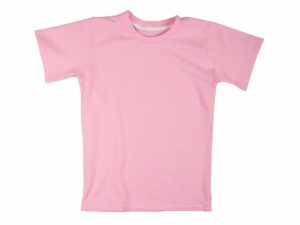
Graphic t-shirts are a step up from plain t-shirts, as they feature a variety of designs and prints. These t-shirts can be found in a wide range of colors and styles, making them perfect for expressing your personality.
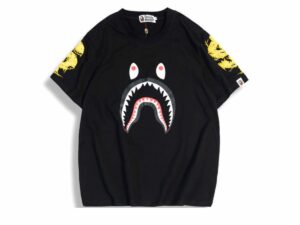
Polo t-shirts are a more formal option than plain or graphic t-shirts. They typically feature a collar and button placket and are made from a variety of different fabrics.
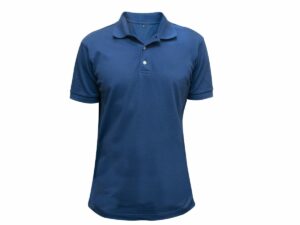
Henley t-shirts are similar to polo t-shirts, but they do not have a collar. They are usually made from a lightweight fabric, making them perfect for layering.
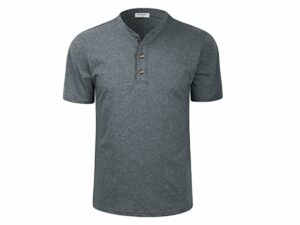
Hooded t-shirts are a great option for those who want extra warmth and coverage. They usually have a kangaroo pocket in the front and can be found in a variety of colors and styles.
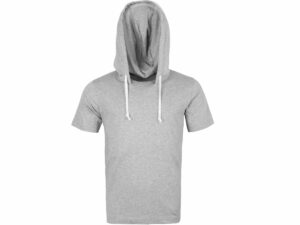
When it comes to t-shirts, there are a variety of different fabric options that you can choose from. The type of fabric you ultimately choose will depend on many factors, including the intended use for the t-shirt, your budget, and personal preferences. In this section, we’ll take a look at some of the most popular fabric options for t-shirts in the market today.
Cotton is by far the most popular fabric choice for t-shirts. It’s soft, comfortable, and relatively inexpensive. Cotton t-shirts are perfect for everyday wear or for activewear that will see a lot of movement and sweating. One downside to cotton t-shirts is that they tend to shrink when washed, so be sure to buy a size up if you’re planning on washing your t-shirt frequently.
Polyester t-shirts are also very popular, especially for activewear. Polyester is a synthetic fabric that is less prone to shrinking than cotton.
It is also more durable and quick-drying, making it a great option for t-shirts that will see a lot of wear and tear. However, polyester t-shirts can sometimes be less comfortable than cotton t-shirts, as they can feel stiffer and more synthetic.
Many t-shirts on the market today are made from a blend of cotton and polyester. This gives the t-shirt the benefits of both fabrics – it’s soft and comfortable like cotton, but more durable and quick-drying like polyester. Blend t-shirts are a great option for those who want the best of both worlds.
Linen t-shirts are becoming more popular in recent years, as they offer a stylish and unique look. Linen is a natural fabric that is made from the flax plant. It is very strong and durable, but can also be quite expensive.
Linen t-shirts tend to be less comfortable than cotton or polyester t-shirts, as they can feel stiff and scratchy. However, they are perfect for those who are looking for a stylish and unique t-shirt option.
Bamboo t-shirts are a relatively new option on the market. Bamboo is a sustainable fabric that is soft, comfortable, and environmentally friendly. Bamboo t-shirts are perfect for those who are looking for an eco-friendly t-shirt option.
Spandex t-shirts are becoming more popular in recent years, as they offer a tight, body-hugging fit. Spandex t-shirts are perfect for those who are looking for a t-shirt that will show off their muscles. However, spandex t-shirts can be less comfortable than other t-shirt options, as they can feel constricting and uncomfortable.
As t-shirt printing has become more popular, more and more people have started to experiment with different styles and fits. Now, there are four main types of fitting styles for t-shirts: the classic fit, the slim fit, the relaxed fit, and the oversized fit. Let’s go over these types one by one.
| Fitting Style | Description |
| Classic | The classic fit is the most common type of t-shirt fit. It’s a standard shirt that fits most people well. If you’re looking for a classic t-shirt that you can wear every day, this is the style for you. |
| Slim | The slim fit is a more tailored style of t-shirt that is tighter fitting than the classic fit. This style is perfect if you want to show off your body shape or if you want to wear a t-shirt that isn’t as baggy. |
| Relaxed | The relaxed fit is looser than the classic fit and perfect for people who want to feel comfortable and casual. This style is great for weekend wear or for when you’re working out. |
| Oversized | The oversized fit is the biggest and most baggy style of t-shirt. If you want to make a statement, this is the style for you. Oversized t-shirts are also great for hiding figure flaws. |
There are many printing options available for t-shirts, and the type of printing you choose will depend on your budget and the t-shirt design you have in mind. The most popular printing options include the following:
Screen printing is the most popular printing method for t-shirts. It is a printing technique that uses a mesh screen to transfer ink onto a substrate, such as fabric.
The image is created by forcing ink through a mesh screen, which has a stenciled design on it. Screen printing is ideal for large quantities, as it is a fast and efficient printing process.
Direct to garment printing, also known as DTG printing, is a digital printing process that prints directly onto t-shirts. This process is similar to desktop inkjet printers, except that the printer is used to print directly onto fabric. DTG printing is a high-quality printing process that produces vivid colors and sharp images.
Heat transfer vinyl (HTV) is a type of vinyl that can be heat pressed onto t-shirts. This type of vinyl is available in a variety of colors and styles, making it perfect for creating custom t-shirts. HTV can be applied using an iron or heat press, making it an easy way to add graphics or text to t-shirts.
Sublimation printing is a unique type of printing that uses heat and pressure to print images onto t-shirts. This process causes the ink to transform from a solid to a gas, resulting in vibrant and colorful prints. Sublimation printing is perfect for intricate designs and photographic prints.
There are a few t-shirt designs that are popular among t shirt factories. Here are some of them:
These t-shirts have a design printed on them. Cotton and polyester are the usual fabrics used for these t-shirts. This is a popular choice for wholesale tee shirt suppliers because it is relatively cheap and the results are good.
Embroidery is where a design is stitched onto the t-shirt. This is usually done by machine but it can also be done by hand. Embroidered t-shirts are more expensive than printed t-shirts but they are also more durable, especially when made by hand. This is most typically used for thick shirts.
This is a raised print that is often used for logos. It is made by printing a design onto a piece of fabric and then stitching it onto the t-shirt. The results are very noticeable and this is a good choice for t-shirts that need to make a statement.
Applique is where a design is cut out of fabric and then sewn onto the t-shirt. This is a more expensive option but it can create some very interesting t-shirt designs.
Starting a t-shirt brand can be a fun and profitable way to turn your creative ideas into a real business. Here are the five steps you need to take to get started:
The t-shirt market is saturated, so it’s important to choose a niche that you can own. What are you passionate about? What do you know a lot about? What can you offer that nobody else can? Narrowing your focus will help you create t-shirts that people will want to buy.
Your t-shirt brand needs a strong identity that sets it apart from the competition. This includes a logo, color palette, and font style. Be sure to stick with these elements across all of your branding materials, from your website to your social media pages.
It’s important to work with high-quality clothing suppliers who can produce t-shirts that meet your standards. Do your research and compare prices before making a decision.
One manufacturer you may check out is Hongyu Apparel. With over 20 years of experience in clothing manufacturing, we have been able to work with many fashion brands all over the world. We offer a wide variety of products including:
Contact us today so we can help you get started on your t-shirt brand.
The key to success in the t-shirt industry is standing out from the competition with creative designs and unique messaging. Be sure to keep things fresh by regularly releasing new collections and staying on top of current trends.
Starting a clothing line is not as easy as it seems. Even if you have the most creative and compelling designs, without a good t-shirt manufacturer, your brand will not go anywhere. Here are five tips to keep in mind when sourcing for a t-shirt manufacturer:
Before you narrow down your choices, it is important to do some research on your options. You can look online or ask for referrals from friends or businesses who have sourced for wholesale t shirt manufacturers before. This will help you to get an idea of the different tee shirt suppliers available as well as their rates.
Once you have done your research, you should have a good idea of how much it will cost to source for a t-shirt manufacturer. Knowing your budget will help you to narrow down your choices and make the sourcing process easier.
When sourcing for a t-shirt manufacturer, it is important to consider the manufacturing process. Some tee shirt manufacturers may use screen printing while others may use digital printing. each method has its advantages and disadvantages, so it is important to choose the one that best suits your needs.
Another important factor to consider when sourcing for quality t shirt manufacturers is the quality of the shirts. You want to make sure that the shirts are made from high-quality materials and that they are well constructed. It is also important to consider the printing quality of the shirts since this can impact their overall appearance.
When sourcing for a t-shirt manufacturer, be sure to ask about turnaround time and delivery. You want to make sure that the shirts will be delivered promptly and that they will meet your expectations in terms of quality and appearance.
When it comes to t-shirt manufacturing, there are a few key cost factors you should keep in mind. Here are five of the most important:
The cost of the fabric used in t-shirts can vary significantly depending on the type and quality of the material. Higher quality materials will generally be more expensive, so it’s important to choose wisely. It typically costs more to produce t-shirts made from 100% cotton than it does to produce t-shirts made from a polyester blend.
The cost of t-shirt printing and embellishments will also vary depending on the complexity of the design. Simple t-shirts with one or two colors and no embellishments will be less expensive to produce than t-shirts with complex designs that require multiple colors and special effects. For bulk orders, this typically ranges from $0.50 to $10 per t-shirt.
The cost of shipping and handling t-shirts will vary depending on the size of the order and the destination. For small orders, it may be possible to find bulk t shirt manufacturers who offer free shipping. For larger orders, it’s important to factor in the cost of shipping when calculating the total cost of t-shirt manufacturing.
Most wholesale t shirt suppliers have minimum order requirements, meaning they won’t produce t-shirts unless you order a certain quantity. The minimum order quantity (MOQ) can range from a few dozen t-shirts to several thousand, so it’s important to find a t-shirt manufacturer that can meet your needs.
Some t shirt manufacturers with custom tags charge setup fees for new orders, which can range from $50 to $200. This is typically a one-time fee that covers the cost of creating the screens or other printing plates needed to produce your t-shirts.
As anyone in the t-shirt business knows, launching a successful brand is no easy feat. There are a lot of moving parts, from design to production to marketing.
And if any one of those elements is off, it can spell disaster for your business. With that in mind, here are four mistakes to avoid before launching your t-shirt brand:
Your t-shirt designs need to be on point if you want to compete in today’s market. Hire a professional designer, or at least make sure your team has a strong understanding of design principles.
Shoddy construction and poor fabric choice will doom your shirts from the start. Make sure you partner with a reputable manufacturer who can produce high-quality garments.
Even the best t-shirt brands need a solid marketing strategy to reach their target audience. Plan out your marketing campaigns well in advance, and make sure you allocate enough budget to get the word out there.
Once your shirts are out in the world, you need to be prepared to deal with customer inquiries and concerns. Make sure you have a system in place to handle customer service and train your team members accordingly. By avoiding these mistakes, you’ll be well on your way to launching a successful t-shirt brand.
Launching a clothing line can be daunting, but with the right resources, it can also be an incredibly rewarding experience. And, as we’ve seen, there are some things you can do to increase your chances of success.
At Hongyu Apparel, we’re passionate about helping new brands make a name for themselves in the industry, and we want to help you do just that. Contact us today to learn more about our services and how we can help you take your business to the next level!
